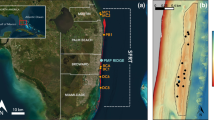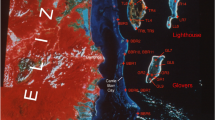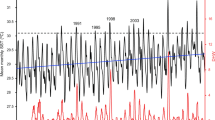Abstract
Rising ocean temperatures have reduced rates of coral calcification and increased rates of coral mortality, thereby negatively impacting the health of coral reef ecosystems1,2. Nevertheless, the response of corals to thermal stress seems to vary spatially across the reef environment3,4. Here, we show that between 1982 and 2008 in the western Caribbean Sea, skeletal extension within forereef colonies of the reef-building coral Siderastrea siderea declined with increasing seawater temperature, whereas extension rates of backreef and nearshore colonies were not impacted. These results suggest that forereef S. siderea corals are more vulnerable to ocean warming than their backreef and nearshore counterparts. This may arise from backreef and nearshore coral colonies experiencing greater baseline diurnal and seasonal thermal fluctuations than forereef colonies, which may promote acclimatization and/or adaptation to more recent anthropogenic thermal stress. These findings reveal how corals have responded to recent anthropogenic warming, offer insights into how they are likely to respond to future warming and highlight the importance of understanding cross-reef differences in coral thermal tolerance for managing coral reef ecosystems in an era of rapid regional and global climate change.
This is a preview of subscription content, access via your institution
Access options
Subscribe to this journal
Receive 12 print issues and online access
$209.00 per year
only $17.42 per issue
Buy this article
- Purchase on Springer Link
- Instant access to full article PDF
Prices may be subject to local taxes which are calculated during checkout




Similar content being viewed by others
References
Hoegh-Guldberg, O. & Bruno, J. F. The impact of climate change on the World’s marine ecosystems. Science 328, 1523–1528 (2010).
Cantin, N. E., Cohen, A. L., Karnauskas, K. B., Tarrant, A. M. & McCorkle, D. C. Ocean warming slows coral growth in the central Red Sea. Science 329, 322–325 (2010).
Barshis, D. J. et al. Protein expression and genetic structure of the coral Porites lobata in an environmentally extreme Samoan back reef: Does host genotype limit phenotypic plasticity? Mol. Ecol. 19, 1705–1720 (2010).
Weis, V. M. The susceptibility and resilience of corals to thermal stress: Adaptation, acclimatization or both? Mol. Ecol. 19, 1515–1517 (2010).
Hansen, J. et al. Global temperature change. Proc. Natl Acad. Sci. USA 103, 14288–14293 (2006).
Deser, C., Phillips, A. S. & Alexander, M. A. Twentieth century tropical sea surface temperature trends revisited. Geophys. Res. Lett. 37, L10701 (2010).
Kleypas, J. A., Danabasoglu, G. & Lough, J. M. Potential role of the ocean thermostat in determining regional differences in coral reef bleaching events. Geophys. Res. Lett. 35, L03613 (2008).
Trenberth, K. et al. in IPCC Climate Change 2007. The Physical Science Basis (eds Solomon, S. et al.) 235–336 (Cambridge Univ. Press, 2007).
Glynn, P. W. Coral reef bleaching: Ecological perspectives. Coral Reefs 12, 1–17 (1993).
Glynn, P. W. & D’Croz, L. Experimental evidence for high temperature stress as the cause of El Niño-coincident coral mortality. Coral Reefs 8, 181–191 (1990).
Porter, J. W., Fitt, W. K., Spero, H. J., Rogers, C. S. & White, M. W. Bleaching in reef corals: Physiological and stable isotopic responses. Proc. Natl Acad. Sci. USA 86, 9342–9346 (1989).
Hoegh-Guldberg, O. Climate change, coral bleaching and the future of the world’s coral reefs. Mar. Freshwat. Res. 50, 839–866 (1999).
McCloskey, L., Wethey, D. & Porter, J. The measurements and interpretation of photosynthesis and respiration in reef corals. Monogr. Oceanogr. Methodol. 5, 379–396 (1978).
Muscatine, L. & Weis, V. in Primary Productivity and Biogeochemical Cycles in the Sea Vol. 43 (eds Woodhead, A. D. & Falkowski, P. G.) 257–271 (Plenum, 1992).
Cooper, T. F., De’ath, G., Fabricius, K. E. & Lough, J. M. Declining coral calcification in massive Porites in two nearshore regions of the northern Great Barrier Reef. Glob. Change Biol. 14, 529–538 (2008).
De’ath, G., Lough, J. M. & Fabricius, K. E. Declining coral calcification on the Great Barrier Reef. Science 323, 116–119 (2009).
Tanzil, J., Brown, B., Tudhope, A. & Dunne, R. Decline in skeletal growth of the coral Porites lutea from the Andaman Sea, South Thailand between 1984 and 2005. Coral Reefs 28, 519–528 (2009).
Mumby, P. J. et al. Reserve design for uncertain responses of coral reefs to climate change. Ecol. Lett. 14, 132–140 (2010).
Veron, J. E. Coral of the World Vol. 2, 140–141 (Australian Institute of Marine Science, 2000).
Reynolds, R. W. et al. Daily high-resolution-blended analyses for sea surface temperature. J. Clim. 20, 5473–5496 (2007).
Castillo, K. & Lima, F. Comparison of in situ and satelite-derived (MODIS-Aqua/Terra) methods for assessing temperatures on coral reefs. Limnol. Oceanogr. 8, 107–117 (2010).
Aronson, R. A., Precht, W. P., Toscano, M. T. & Koltes, K. K. The 1998 bleaching event and its aftermath on a coral reef in Belize. Mar. Biol. 141, 435–447 (2002).
Helmle, K., Kohler, K. & Dodge, R. Int. Soc. Reef Stud. 2002 European Meeting Cambridge, England. Sept. 4–7 (2002).
Castillo, K., Ries, J. & Weiss, J. Declining coral skeletal extension for forereef colonies of Siderastrea siderea on the Mesoamerican Barrier Reef System, southern Belize. PLoS ONE 6, e14615 (2011).
Gleeson, M. W. & Strong, A. E. Applying MCSST to coral reef bleaching. Adv. Space Res. 16, 151–154 (1995).
Donner, S. D., Knutson, T. R. & Oppenheimer, M. Model-based assessment of the role of human-induced climate change in the 2005 Caribbean coral bleaching event. Proc. Natl Acad. Sci. USA 13, 5483–5488 (2007).
Lima, F. & Wethey, D. Three decades of high-resolution coastal sea surface temperatures reveal more than warming. Nature Commun. 3, 1–13 (2012).
Guzmán, H. M. & Tudhope, A. Seasonal variation in skeletal extension rate and stable isotopic (13C/12C and 18O/16O) composition in response to several environmental variables in the Caribbean reef coral Siderastrea siderea. Mar. Ecol. Progr. Ser. 166, 109–118 (1998).
Pinheiro, J., Bates, D., Saikat, D., Sarkar, D. & R Development Core Team, nlme Linear and Nonlinear Mixed Effects Models. R Package Version 3.1-102 (2011).
R Development Core Team R: A Language and Environment for Statistical Computinghttp://www.R-project.org (2010).
Acknowledgements
We thank J. Bruno, D. Garbutt and V. Jacobs for field support. We thank C. Martens, A. Mooney and members of the Bruno laboratory for discussions about the subjects presented here. We thank the Belize Fisheries Department for providing the necessary permits for the collection and exportation of coral cores. We are grateful to the University of North Carolina Campus Health Services Radiology Unit for providing access to X-ray facilities. This research was supported by the Carolina Postdoctoral Fellowship for Faculty Diversity (to K.D.C.), Seeding Postdoctoral Innovators in Research and Education (NIGMS 5K12-GM000678) fellowship to K.D.C., NOAA award NA11OAR431016 (to J.B.R. and K.D.C.) and NSF award 1031995 (to J.B.R.).
Author information
Authors and Affiliations
Contributions
K.D.C. and J.B.R. designed the experiment. K.D.C., J.B.R., J.M.W. and F.P.L. assembled the input data. J.M.W. carried out the statistical analysis with support from K.D.C. and J.B.R. K.D.C. and J.B.R. wrote the paper in collaboration with J.M.W. and F.P.L. All authors read and provided comments and feedback on the manuscript.
Corresponding author
Ethics declarations
Competing interests
The authors declare no competing financial interests.
Supplementary information
Supplementary Information
Supplementary Information (PDF 1247 kb)
Rights and permissions
About this article
Cite this article
Castillo, K., Ries, J., Weiss, J. et al. Decline of forereef corals in response to recent warming linked to history of thermal exposure. Nature Clim Change 2, 756–760 (2012). https://doi.org/10.1038/nclimate1577
Received:
Accepted:
Published:
Issue Date:
DOI: https://doi.org/10.1038/nclimate1577
This article is cited by
-
Newly deceased Caribbean reef-building corals experience rapid carbonate loss and colonization by endolithic organisms
Communications Biology (2023)
-
Mapping coral calcification strategies from in situ boron isotope and trace element measurements of the tropical coral Siderastrea siderea
Scientific Reports (2021)
-
Trait gradients inform predictions of seagrass meadows changes to future warming
Scientific Reports (2021)
-
Increasing coral calcification in Orbicella faveolata and Pseudodiploria strigosa at Flower Garden Banks, Gulf of Mexico
Coral Reefs (2021)
-
Eukaryotic plankton communities across reef environments in Bocas del Toro Archipelago, Panamá
Coral Reefs (2020)



